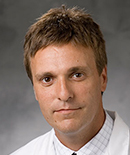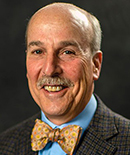- Building the Best Cardiac Operating Room Team: Lessons in Leadership, Teamwork and Communication (218)
- 1:10-2:10 p.m. Sunday
- BCEC Room 104BC
Good chemistry is required in medicine — not just in pharmaceutical treatments but among the members of the treatment team. The qualities of a good team and how they can be developed will be examined in a Refresher Course session Sunday.

Atilio Barbeito, M.D., M.P.H
“In the day-to-day practice of anesthesiology, we realize that many of the important aspects have to do not with technical things but with the non-technical — how the team works together and how they communicate with one another,” said Atilio Barbeito, M.D., M.P.H. “That is a key component of taking care of patients today because medicine is a team-based activity, and this is something not discussed often enough.”

Jonathan B. Mark, M.D.
Dr. Barbeito and Jonathan B. Mark, M.D., both anesthesiologists at Duke University and the Durham VA Medical Center, will take an unconventional approach to their presentation. Instead of traditional lectures, they will converse with one another and try to engage the audience in exploring what makes a good cardiac O.R. team.
The two have used a grant from the VA National Center for Patient Safety to study code (CPR) teams and the handoff of patients from the O.R. to the ICU. This work has involved health care professionals as well as human factors engineers and experts in leadership and teamwork from the Duke Fuqua School of Business/Coach K Center on Leadership and Ethics.
“We have been impressed by the importance of these other skill sets that our collaborators have brought to our work,” Dr. Mark said. “We are still in the early days of building these non-technical skills into medical practice.”
The focus of their work has been on the O.R. and ICU environments and the challenge of people with different skill sets and skill levels working together effectively and safely, Dr. Barbeito said.
“There are always hierarchies within these mixed and dynamic groups. The members have different professional backgrounds and different but complementary skills,” he said. “The composition of an operating room, intensive care unit or code team may be different every day. The work done by these teams often has a time pressure element that is highly stressful. These are key ingredients for complicated team dynamics.
“We also are going to talk about building a culture of psychological safety in these environments and the use of tools like checklists, briefings and debriefings. We will discuss how great teams have mutual trust and therefore are not afraid of conflict. The best decisions are made when there is a little bit of conflict among the different providers.”
Drs. Mark and Barbeito said their goal is to provide a thought-provoking presentation about the dynamics of successful and dysfunctional teams so attendees can take those insights back to their practices.
“We are going to make the point that what we are talking about is hard work, deeply human work,” Dr. Mark said. “It really cuts to the heart of what we all experience in our daily lives — relationships, effective communication and personal fulfillment. It is no longer sufficient to have the technical knowledge and skill to do our work because medical care today always requires the whole team to work well together.”
Return to Archive Index